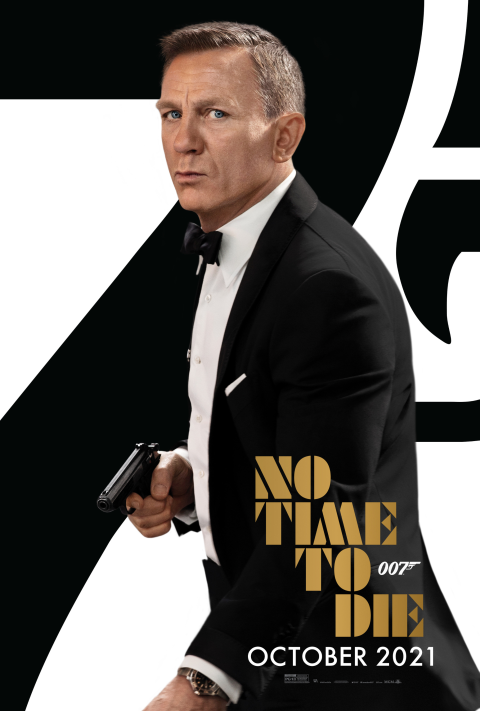Directed by Cary Joji Fukunaga
Written by Neal Purvis & Robert Wade, Cary Joji Fukunaga (screenplay and story), Phoebe Waller-Bridge (screenplay), based on characters created by Ian Fleming
Cast: Daniel Craig, Léa Seydoux, Rami Malek, Lashana Lynch, Ralph Fiennes, Ben Whishaw, Naomie Harris, Rory Kinnear, Jeffrey Wright, Billy Magnussen, Christoph Waltz, David Dencik, Ana de Armas, Dali Benssalah, Lisa-Dorah Sonnet, Coline Defaud, Mathilde Bourbin, Hugh Dennis, Priyanga Burford, Brigitte Millar
Soundtrack: Hans Zimmer
16 years ago today, Daniel Craig was announced as the sixth actor to play James Bond in EON Productions’ long-running franchise.
There was controversy.
He had blonde hair! He had blue eyes! He wore a life-jacket on a boat!
(As if Roger Moore was tall, dark, and handsome?)
Personally, I wasn’t bothered. Much like Batman Begins following Batman & Robin, after Die Another Day, I was ready for anything new, but I’ve talked about that at length already.
More to the present (and to borrow a joke from Mike Stoklasa): it’s been so long since the last Bond film, it’s almost time for my pon farr!
To be fair, it wasn’t quite the 2313 days between Licence to Kill and Goldeneye, but is the 2163 days between SPECTRE and No Time to Die that far off?
Not really, but what’s important is that the movie is here at last, which means Daniel Craig can finally start to get on with his life (and I don’t mean that disparagingly).
Unlike the previous go around, I didn’t do much to get myself hyped up for this installment, because there’s no way any Bond movie could be worse following SPECTRE (though I would recommend a re-watch before seeing the new one, or at least a read through the plot on Wikipedia).
The reaction so far seems somewhat divided, which makes sense, but like so many things these days, the minority is far noisier than the majority of people who have been reasonably satisfied with the product.
But enough about all that.
To me, No Time to Die feels like the first time in the Craig era where everyone involved (including Hans Zimmer!) said, “Hey, let’s go out and make a James Bond movie; because that’s what we do, right?”
Not that I haven’t liked what they’ve done overall to this point, and not that they haven’t previously pulled inspiration from the original source (Casino Royale especially) and past films, but, in many ways, No Time to Die feels like a movie made by somebody who’s a fan the way I’m a fan. Someone who’s seen every movie more than once and can find something they like in each one (or almost, in my case).
In fact, it’s fitting that the MacGuffin of this movie revolves around DNA, because this feels like the only film in the franchise thus far that truly pulls something from every iteration of Bond: Connery, Lazenby, Moore, Dalton, Brosnan, Craig himself, and, yes, Ian Fleming’s novels. On top of that, it does an admirable job of picking up the tatters of some poor serialization in the previous entry and finding a thread to carry forward into this film.
And, of course, it’s a farewell to Daniel Craig in the role.
Of all the Bond actors who have had at least four cracks at the character, Craig certainly gets the strongest exit of any of them; which isn’t exactly difficult given that the competition is Diamonds Are Forever, A View to A Kill (which I do enjoy), and Die Another Day, but the point still stands.
Exactly how much of this we can lay at the feet of writer/director Cary Fukunaga, I can’t say for certain, but I wouldn’t be upset if he came back for another one down the line.
If I have one particular criticism of No Time to Die, it’s that there’s some dodgy CGI sprinkled in that I can’t help thinking would have been better handled in the Brosnan era. And I don’t mean that they would have done it 100% in-camera, I just think more effort would have gone into perhaps shooting things in miniature and compositing in other elements.
And yes, the movie felt a bit long the first time I saw it, but upon seeing it a second time, it really didn’t bother be at all.
In the end, I’m hedging myself on a rating a little bit, but perhaps the best compliment I can give is that having seen the movie twice, I do feel a desire to see it at least a third time, and that doesn’t come around too often.
And if you can see it in IMAX, all the better.
Rating: ★★★★☆





